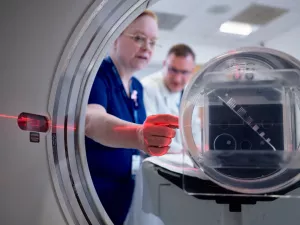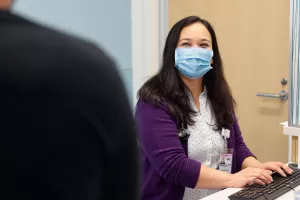Abnormal growths in the lungs, or lung nodules, are very common. There is positive news: many of them are not cancerous and may be associated with other conditions, such as rheumatoid arthritis, scarring from another infection or other inflammatory conditions. Even if a lung nodule is cancerous and small, it is usually treatable. This is why screening is important if you are considered at high risk for lung cancer.
Screening and early detection is key
Did you know that lung cancer is the leading cause of cancer death in the United States for both men and women? That’s why early detection and appropriate screening are key for survival if considered high risk. It starts with an X-ray or lose-dose CT scan to see if you have nodules or abnormal spots on your lungs.
According to the American Lung Association, getting screened for lung cancer can increase your chances of survival.
You should be screened for lung cancer if you are:
- Between the ages of 50-80
- A smoker with a 20-pack-year history (calculated by the average amount of packs smoked per year)
- A current smoker or quit less than 15 years ago

Conditions
Decreasing your risk is key to lessening your lung nodules and cancer probability. If you are over 50 years old and smoke, your chances of having lung nodules are greater. But, even if you have never smoked, exposure to occupational or environmental chemicals or even secondhand smoke can elevate your risk.
You should get tested if you have any of these symptoms:
Testing
Our team specializes in conducting low-dose CT lung cancer screenings, which we are delighted to provide to eligible individuals. By utilizing this method, we can identify lung nodules and cancer early on, significantly decreasing the likelihood of dying for patients at high risk. In some cases, PET scans or bronchoscopies may also be recommended. Screening greatly increases the chances of survival for high-risk individuals.
Treatments
It's possible that you have a lung nodule that isn't cancerous and doesn't cause any discomfort. If that's the case, your doctor may recommend medication to help. However, if it turns out to be cancer, we will create a plan that's tailored just for you.
- Surgery
- Radiation
- Chemotherapy
- Stereotactic body radiotherapy (SBRT)
- Antibiotics
- Pain management
- Nutritional and emotional support

From regular office visits to inpatient stays, find the healthcare you need and deserve close to home.

Meet the doctors and care team devoted to supporting you every step of the way along your path to better health.